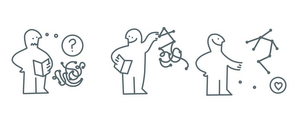Information
- Publication Type: Journal Paper with Conference Talk
- Workgroup(s)/Project(s):
- Date: 2025
- Journal: Computer Graphics Forum
- Open Access: yes
- Article Number: e70140
- ISSN: 1467-8659
- DOI: 10.1111/cgf.70140
- Pages: 12
- Publisher: WILEY
- Keywords: CCS Concepts, Empirical studies in visualization, human-centered computing, Visualization Application Domains
Abstract
Physicalizations, which combine perceptual and sensorimotor interactions, offer an immersive way to comprehend complex data visualizations by stimulating active construction and manipulation. This study investigates the impact of personal construction on the comprehension of physicalized networks. We propose a physicalization toolkit—NODKANT—for constructing modular node-link diagrams consisting of a magnetic surface, 3D printable and stackable node labels, and edges of adjustable length. In a mixed-methods between-subject lab study with 27 participants, three groups of people used NODKANT to complete a series of low-level analysis tasks in the context of an animal contact network. The first group was tasked with freely constructing their network using a sorted edge list, the second group received step-by-step instructions to create a predefined layout, and the third group received a pre-constructed representation. While free construction proved on average more time-consuming, we show that users extract more insights from the data during construction and interact with their representation more frequently, compared to those presented with step-by-step instructions. Interestingly, the increased time demand cannot be measured in users' subjective task load. Finally, our findings indicate that participants who constructed their own representations were able to recall more detailed insights after a period of 10–14 days compared to those who were given a pre-constructed network physicalization. All materials, data, code for generating instructions, and 3D printable meshes are available on
https://osf.io/tk3g5/.
Additional Files and Images
Additional images and videos
Additional files
Weblinks
BibTeX
@article{pahr-2025-nodkant,
title = "NODKANT: exploring constructive network physicalization",
author = "Daniel Pahr and Sara Di Bartolomeo and Henry Ehlers and
Velitchko Filipov and C. Stoiber and W Aigner and Hsiang-Yun
Wu and Renata Raidou",
year = "2025",
abstract = "Physicalizations, which combine perceptual and sensorimotor
interactions, offer an immersive way to comprehend complex
data visualizations by stimulating active construction and
manipulation. This study investigates the impact of personal
construction on the comprehension of physicalized networks.
We propose a physicalization toolkit—NODKANT—for
constructing modular node-link diagrams consisting of a
magnetic surface, 3D printable and stackable node labels,
and edges of adjustable length. In a mixed-methods
between-subject lab study with 27 participants, three groups
of people used NODKANT to complete a series of low-level
analysis tasks in the context of an animal contact network.
The first group was tasked with freely constructing their
network using a sorted edge list, the second group received
step-by-step instructions to create a predefined layout, and
the third group received a pre-constructed representation.
While free construction proved on average more
time-consuming, we show that users extract more insights
from the data during construction and interact with their
representation more frequently, compared to those presented
with step-by-step instructions. Interestingly, the increased
time demand cannot be measured in users' subjective task
load. Finally, our findings indicate that participants who
constructed their own representations were able to recall
more detailed insights after a period of 10–14 days
compared to those who were given a pre-constructed network
physicalization. All materials, data, code for generating
instructions, and 3D printable meshes are available on
https://osf.io/tk3g5/.",
journal = "Computer Graphics Forum",
articleno = "e70140",
issn = "1467-8659",
doi = "10.1111/cgf.70140",
pages = "12",
publisher = "WILEY",
keywords = "CCS Concepts, Empirical studies in visualization,
human-centered computing, Visualization Application Domains",
URL = "https://www.cg.tuwien.ac.at/research/publications/2025/pahr-2025-nodkant/",
}
 teaser:
An IKEA-like illustration of a person looking at a dataset, assembling a graph manually, and being happy with the result
teaser:
An IKEA-like illustration of a person looking at a dataset, assembling a graph manually, and being happy with the result


 paper
paper